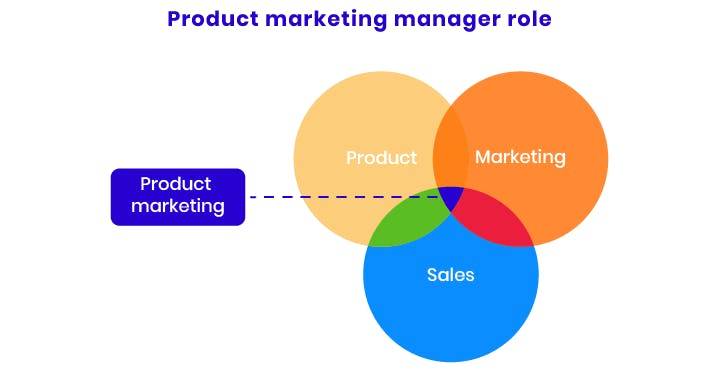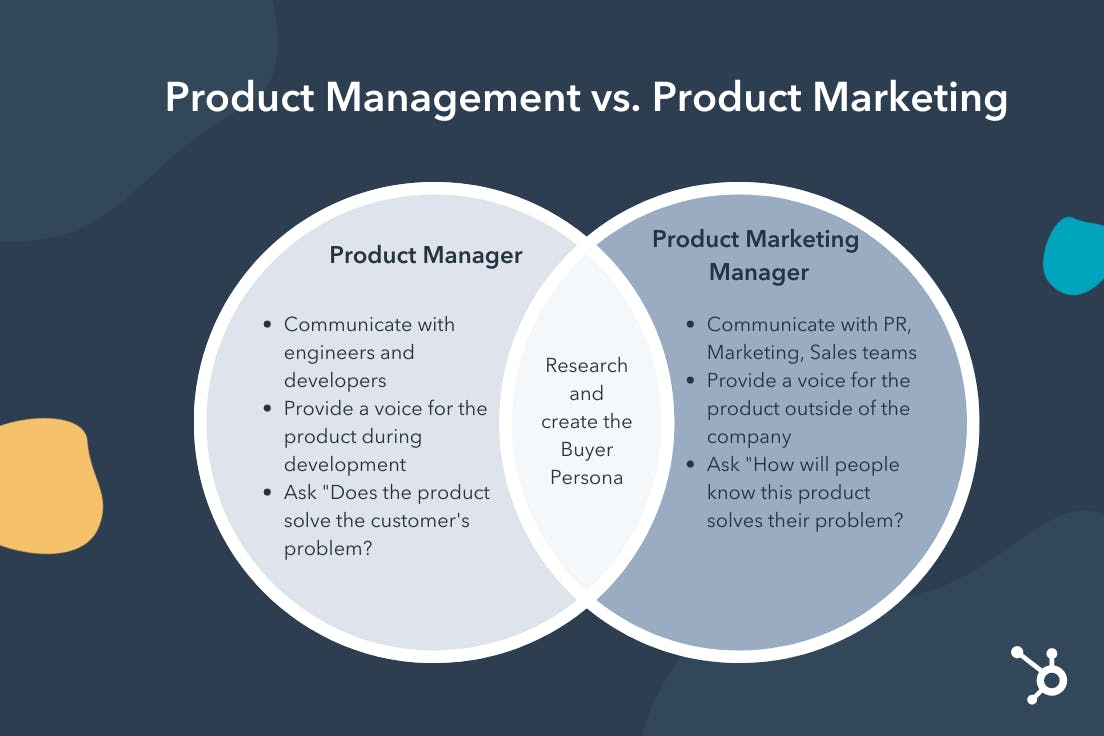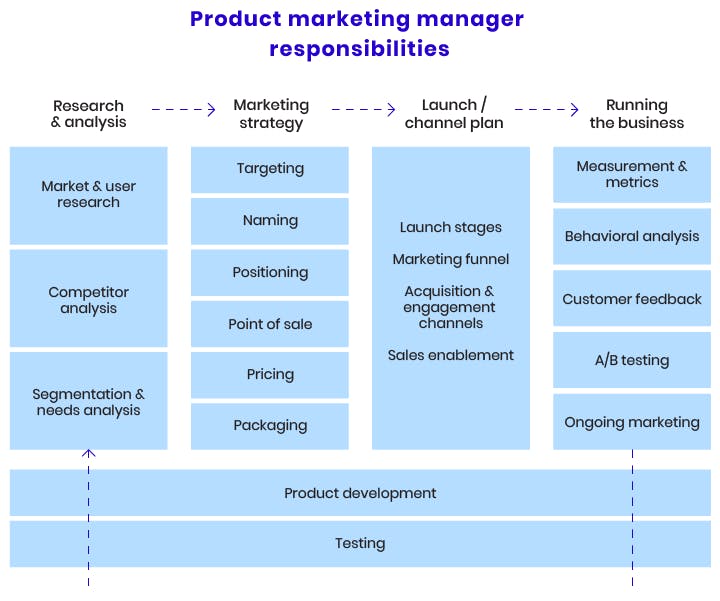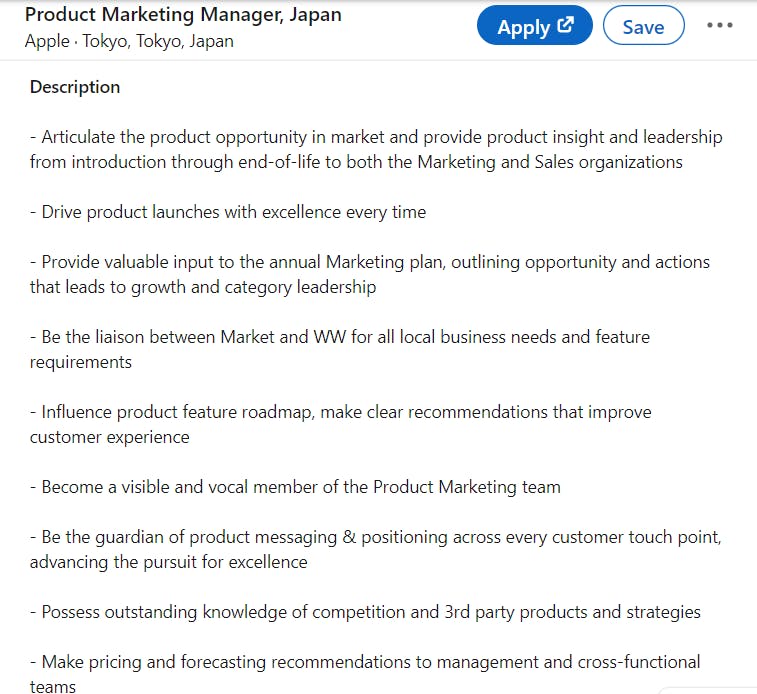Product marketing manager: responsibilities, skills and how to hire one
May 18th, 2023

Contents
What is a product marketing manager?
What do product marketing managers do?
Skills of a product marketing manager
How to hire the right PMM?
Product marketing managers play an immense role in a product launch success. Businesses rely on these specialists to manage promotional efforts and develop positioning statements that eventually result in sales. In addition, PMMs are responsible for producing a user-friendly product and achieving outstanding financial outcomes.
As the title implies, a product marketing manager is in charge of managing all of the marketing initiatives for products. However, the position involves much more than that. On the one hand, a specialist is responsible for the market adaptation of the product, explains the value of the offering to the buyer, formulates the value proposition, answers questions, and resolves doubts that arise before the purchase. On the other hand, PMM trains sales staff, creates marketing materials, and launches customer acquisition campaigns.
In this article, we will cover a PMM’s role in great detail and discuss the value of such a person for a business success.
What is a product marketing manager?
A product marketing manager is a specialist whose primary task is to convey the value of the offering to the market. A professional’s goal is to grasp the value proposition and use this knowledge to create messages that appeal to consumers, prospects, and stakeholders. In short, PMM’s role combines a researcher, promoter, and salesperson. This individual takes control over a product’s positioning, branding, and messaging.
This specialist’s range of responsibilities depends on the size of the company and its sales model. A professional performs various tasks that help advertise products to customers. PMM takes part in different stages of marketing, including developing a marketing strategy for the company’s products and services, collaborating with the design and sales teams to execute the plan, and analyzing the effectiveness of marketing campaigns. A specialist's main objectives are generating demand for a product, understanding market and customer needs, and implementing marketing initiatives.

A product marketing manager, being an experienced digital marketer, typically has broad business expertise in marketing, sales, technology, and production. In addition, a specialist should have strong communication skills, a passion for learning, and an ability to analyze data. Moreover, a PMM should be empathetic, flexible, and have strategic planning and business skills.
Product manager vs product marketing manager
It can be challenging to distinguish between the roles of product manager and product marketing manager. Although there are some similarities between the two positions, product marketing managers and product managers have very distinct duties.
Let us consider the main differences between a product manager and a product marketing manager. First, the PM is responsible for the overall product’s success. A product manager monitors the implementation of the strategy as the product goes through the planning and building phases. This specialist provides developers, engineers, and designers with daily guidance concerning the product’s functionality and features. Furthermore, a product manager informs external and internal stakeholders about the product’s functions and workflow.

A product marketing manager, in contrast, is more focused on the customer rather than the product. PMM’s key responsibility is to verify that the business completely understands customer requirements and develops products to satisfy those needs. This professional is in charge of the launch and communication strategy. PMM creates a launch plan and collaborates with the social media team, PR, and marketing departments to promote a new or improved product and bring it to market. In addition, after the product’s release, a specialist communicates with customers to explain how it can solve their problems.
It is vital to note that there is no clear boundary between these two roles, as the responsibilities vary from one organization to the other. For example, an early-stage startup can have only a product manager’s position. In this case, a person will perform both roles and will be responsible for the overall direction of the product and for taking the product to market. On the other hand, if a company hires both specialists, the two positions are more like a partnership than two mutually exclusive roles.
In the following paragraphs, we will take a detailed look at the product marketing manager’s set of primary responsibilities.
What do product marketing managers do?
Product marketing managers communicate with various people, including sales representatives, the marketing department, customers, and potential clients. Although the position can vary across different companies, we will list the typical responsibilities you might find in job descriptions.
1. Identify the target customers and their needs
Understanding the target market is crucial for successfully selling a product or service. Therefore, a product marketing manager conducts extensive research to identify who needs the product, who can afford it, and how frequently consumers are likely to purchase it.
Developing relationships with clients is the best method for understanding them. A PMM analyzes how customers make decisions, what problems they are attempting to solve, and why they chose the offering over the alternatives. Knowing a target market helps save time and money on collaborations and advertisements directed at the right demographic.
2. Analyze the competition
Any good offering will encourage rivalry. It doesn't matter if your business came up with a concept first if someone else can market the product more successfully. For this reason, a PMM should possess an outstanding knowledge of competition and third-party products and strategies. A specialist’s task is to analyze the competitive landscape and position the offering to differentiate it from rivals and attract more customers.
Metrics and key performance indicators are vital for any company. The success of marketing strategies significantly impacts both business and revenue objectives. So, a product manager should collect, analyze and report on KPIs to come up with profound ideas that can improve strategies, tactics, and outcomes. As a result, the information PMMs gather from each plan and strategy serves as an indicator of whether the product needs any improvements.
3. Create and update the product messaging
The success of sales and marketing efforts depends on effective communications. A product marketing manager is responsible for creating a compelling product message that promotes the product’s value and ensures a competitive position in a market segment. To produce effective messaging, a PMM uses a set of information pieces, including the target audience, advantages, pain points, solutions, and differentiation.
An expert develops product branding and positioning papers that are the basis for internal and external sales assets, marketing initiatives, online content, solution briefs, presentations, and press releases.
4. Implement go-to-market strategy
While a marketing team manages the customer journey through the marketing and sales funnel, a PMM is responsible for developing and implementing a go-to-market strategy together with a product manager. Before the launch, a product marketing manager conducts research to identify a market opportunity through market-sizing and competitor analysis, develop product positioning, establish pricing, and optimize messaging.
During the launch, a PMM’s responsibility is to keep the teams concentrated on the final goals and inspire them to complete the launch on time. A specialist monitors objectives and key results, such as product deliverables and financial goals, to ensure the team meets deadlines. After the launch, a PMM monitors the metrics and improves marketing strategies. It includes communication with customers in the form of release notes which inform consumers about the features that have been added or changed since the previous launch.
Finally, a PPM takes care of a product launch retrospective. A professional gathers teams to discuss financial goals, engagement and adoption objectives, marketing performance, consumer reaction, and internal enablement effectiveness. Launch retrospective helps your company learn what worked well, what didn't, and what can be done better for the upcoming launch or product update.
5. Launch the product
A product marketing manager is in charge of preparing a product launch plan and coordinating the teams and individuals responsible for the tasks related to the launch. A specialist should ensure that a product reaches the intended audience. The professional is responsible for the pricing and packaging and contributes to the press release of a new product. A product marketing manager’s task is to prepare supporting sales resources, including sell sheets, email templates, presentations, solution briefs, and other materials needed for internal teams.
In addition, a product marketing manager takes care of planning each detail of a product launch while staying in touch with every team member involved in it. They collaborate with market analysts, sales teams, researchers, brand partners, supply chain workers, and other specialists to ensure the launch is successful.
6. Create and manage advertising campaigns
A product marketing manager is responsible for creating and managing advertising campaigns. A professional analyzes comparable ad campaigns to understand which ones worked and which didn't. A PMM also examines commercials for other products that the target market frequently buys and chooses the platforms and channels to place ads. When a product is introduced through an effective advertising campaign, you will not only reach your target market, but they will also be motivated to purchase it.
To optimize the customer experience across various platforms and teams, a product manager should implement content and product marketing best practices. One of the main PMM’s objectives is to ensure product narratives resonate with customers and address their challenges and pain points.
7. Enable your sales team with the right messaging and training
Knowing how to sell a product to prospective customers is essential to its success. If your company uses a person-to-person sales strategy, a product marketing manager must ensure that sales representatives understand your target customers’ needs and know how to communicate with them. A PMM’s task is to educate sales staff by providing training, coaching, and sales enablement materials.
Moreover, a product marketing manager conducts customer surveys to learn what they appreciate about a product and understand how to build a purchasing process. Therefore, after the product launch, your sales team will know how to speak with customers to increase conversions.

Skills of a product marketing manager
Once you have learned about the product marketing manager’s day-to-day responsibilities, it is time to discover the specific skills a talented PMM should have. Below, we will list the skills required for a good product marketing manager.
- SEO and marketing knowledge. PMMs need to have background knowledge in the industry to improve marketing materials. One of the best methods to find and understand your potential clients is through keyword research. Thus, a product marketing manager must be fluent in SEO.
- Organizational and project management skills. A product marketing manager must ensure everyone is on the same page and get them to work together to achieve a common objective. Keeping track of every part of a project is essential to meet deadlines and reach critical goals.
- Problem-solving skills. To stand out from the competition and attract customers’ attention, a PMM should think outside the box and come up with innovative and practical solutions.
- Communication skills. Since a PMM delivers presentations in front of large audiences regularly, this individual should have strong public speaking and communication skills.
- Research and analysis skills. Research and analysis should be two essential PMM’s skills needed for implementing and improving marketing initiatives and strategies.
- Writing skills. A top-notch product marketing manager should have excellent writing skills to produce consistent and compelling content. A professional understands that every business is unique and reflects the company’s values in marketing communication.
- Customer empathy. PMM should understand the requirements and problems of their target market to develop a great strategy.
Further, we will provide some tips that will help you find and choose the best candidate for a product marketing manager position in your company.
How to hire the right PMM?
Let us consider the main steps you should take when hiring a product marketing manager.
Step 1. Decide between a full-time or a freelance PMM
Companies may contemplate employing a freelance product marketing manager to promote their products before the launch and to gather customer feedback. It might be the best option for businesses that don't frequently create and introduce products.
However, if you are constantly designing and launching new products, you should examine the option of hiring a full-time PMM and a product marketing team. This may be less expensive than hiring a contractor, and it can also significantly increase income and help your business address customer issues.
Step 2. Pay attention to PMMs’ ranks
Product marketing employees may hold a variety of positions. These could be product marketing specialists, product marketing managers, and product marketing directors. Product marketing specialists are responsible for analyzing the industry to determine how to sell the product. They also create a strategy for promoting the company's offering and oversee online advertising strategies. It can involve writing texts for posts, improving SEO, and launching pay-per-click ads.
Product marketing managers act as supervisors. They clarify objectives with the experts, delegate tasks to each team member and evaluate the impact of their marketing initiatives. The head of product marketing is in charge of formulating short- and long-term objectives and primary marketing goals and developing pricing strategies.
Step 3. Write a compelling job description
A good job description increases your chances of finding a suitable candidate. The summary of this role should include a thorough list of tasks and the necessary and desired skills for the position. Consider having some or all of the following terms in your product marketing manager job description to increase the visibility of your job ad: product marketing, product marketing manager, marketing manager, marketing specialist, senior marketing manager, marketing communications, and product management. According to Indeed statistics, these are the most common search keywords that result in clicks on product marketing manager positions.

Step 4. Conduct a job interview
When interviewing candidates, pay attention to their marketing expertise, problem-solving skills, and knowledge of innovative product marketing techniques. Ask them about the development of product marketing strategies and the importance of online analytics tools in examining market dynamics. Then candidates can describe a recent example of an effective product marketing strategy.
Hiring the right product marketing manager is not an easy task. However, this specialist can help your business determine whether to move forward with a project and can significantly increase a product’s sales after launch.
